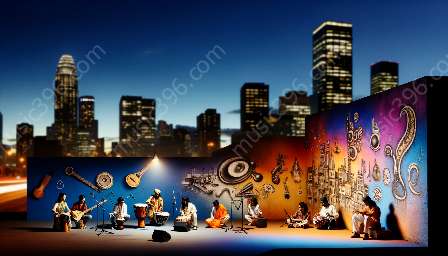Music is a fundamental aspect of African culture, reflecting diverse traditions and aesthetics. The field of ethnomusicology provides theoretical frameworks to analyze the intricate structures and aesthetics of African musical traditions, offering insights into their cultural significance and historical roots. This topic cluster will explore the theoretical approaches used to dissect African musical expressions, providing a deep understanding of their artistic, social, and spiritual dimensions.
Understanding African Musical Traditions
African music encompasses a vast array of styles, instruments, and performance practices, deeply rooted in the continent's diverse cultures and societies. Ethnomusicologists employ various theoretical frameworks to understand and interpret the complexities of African musical traditions, acknowledging their deep connections to identity, community, and spirituality.
1. Structural-Functionalism
Structural-functionalism, a theoretical framework within ethnomusicology, examines the interplay between the structure of musical forms and their functions within African societies. This approach explores how musical elements such as rhythm, melody, and harmony serve social, spiritual, and ceremonial purposes, reflecting the broader dynamics of African communities.
2. Symbolic Anthropology
Symbolic anthropology provides another lens through which to analyze African musical structures and aesthetics. This framework considers the symbolic meanings embedded in musical expressions, highlighting how these forms of artistic communication convey cultural beliefs, values, and narratives within African societies.
3. Performance Theory
Performance theory emphasizes the live and embodied nature of African musical traditions, focusing on the dynamic interactions between performers, audiences, and the broader sociocultural context. This theoretical approach examines how musical performances serve as sites of social negotiation, creativity, and communal expression.
Exploring Aesthetics and Cultural Significance
The aesthetics of African music encompass a wide spectrum of sensory experiences, including rhythmic patterns, vocal techniques, dance, and visual elements. Ethnomusicologists employ theoretical frameworks to analyze the aesthetic dimensions of African musical traditions, shedding light on their emotional, sensory, and artistic qualities.
1. Cultural Ecology
Cultural ecology offers a theoretical framework to explore the interrelationships between African musical aesthetics and the natural and cultural environments in which they are situated. This approach considers how musical expressions are shaped by ecological factors, climate, and geographic landscapes, providing insights into the sensory qualities and emotive resonances of African music.
2. Semiotics and Musical Meaning
Semiotics, the study of signs and symbols, provides a powerful framework for analyzing the meanings embedded in African musical structures and expressions. This approach delves into the symbolic, cultural, and emotional dimensions of music, unraveling the layers of meaning conveyed through sonic, visual, and embodied elements.
3. Postcolonial Theory
Postcolonial theory offers critical perspectives on African musical aesthetics, addressing the legacies of colonialism and the ways in which musical expressions serve as modes of resistance, identity affirmation, and decolonization. This theoretical framework highlights the complexities of cultural hybridity, appropriation, and agency within African musical traditions.
Integration with Ethnomusicology
The study of African musical structures and aesthetics is intricately intertwined with the broader discipline of ethnomusicology, which encompasses the cultural, social, historical, and global dimensions of music. Ethnomusicologists engage with a diverse array of theoretical frameworks to analyze African musical traditions, illuminating their multifaceted meanings and functions within local and transnational contexts.
By integrating theoretical perspectives such as structural-functionalism, symbolic anthropology, performance theory, cultural ecology, semiotics, and postcolonial theory, ethnomusicologists enrich their understanding of African musical expressions and contribute to the preservation and appreciation of diverse cultural heritage.
Ultimately, the theoretical frameworks used to analyze African musical structures and aesthetics underscore the richness, diversity, and deep cultural significance of these musical traditions within the global tapestry of human creativity and expression.



































